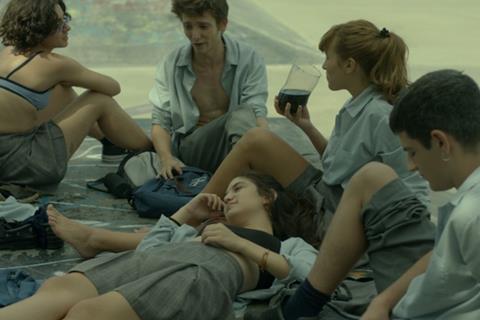Argentina’s Inés Barrionuevo explores fluid adolescent sexuality in her accomplished third feature

Dir. Inés Barrionuevo. Argentina. 2021. 103mins
Young Argentine feminism is loud and proud in Camila Comes Out Tonight, the third feature from writer-director Inés Barrionuevo. Following two other youth-themes movies, Atlantida and last year’s Las Motitos, Barrionuevo offers a politically upfront rallying call that, while somewhat schematically polemical, gets its message across energetically and stylishly. This high school drama is very much a product of the new female film generation empowered by the success of Céline Sciamma, and that the film can be somewhat on the nose won’t prevent it from having an avid following at festivals, especially on women’s and LGBTQ circuits; platform exposure should be lively.
The film’s themes, global as they are in reach, are of course heightened by the specifically Argentinian context
Camila (Nina Dziembrowski) is a teenager living in the city of Mar del Plata, first seen with friends at a museum and contemplating an archive picture of an indigenous girl who was pathologised and punished by society for her powerful sexuality. Having established the film’s agenda in this slightly heavy shorthand, Barrionuevo moves on with the story, which takes off when Camila, her younger sister Martina (Carolina Rojas) and mother Victoria (Adriana Ferrer) relocate to Buenos Aires when her grandmother is taken to hospital with a serious illness.
Camila not only has to move into her grandmother’s joylessly austere flat, but is enrolled at a conservative, formal school, at odds with her liberal upbringing and beliefs. Indeed, when she arrives, the head teacher (Guillermo Pfening) tells her off about the green ribbon that denotes her support for Argentina’s pro-abortion Marea Verde (Green Tide) movement, informig her that the school is no place for political ideologies – although the institution is clearly built on, and actively promotes, ideologies of the most reactionary kind.
Still, Camila quickly finds kindred spirits to hang with – including Bruno (Diego Sanchéz), a tattooed hunk who’s also a sensitive, thoughtful scientist and an absolute non-jock, and fun-loving golden girl Clara (Maite Valero). After making out with Bruno, sexually fluid Camila has an intense sexual encounter with Clara. That Camila is altogether free of hang-ups and in touch with her desires – unlike the more conservatively-presenting Clara – means that Barrionuevo can refreshingly dispense with the more laboured traumas that are conventional baggage of the coming-of-age or coming-out movie.Still, there are conflicts in the air, not least to do with Clara’s ex-boyfriend; the class’s macho traditionalist and bully who identifies Camila as a subversive element from the start.
Where the film shows most insight is in the tension between Camila and her divorced mother: Victoria is shown as empathetic and supportive, taking absolutely no pleasure in playing the disciplinarian, although she sometimes has to. When Victoria recedes into the background, it’s because we’re seeing the world entirely through Camila’s eyes – until we realise that, caught up in the rush of her own experience, the girl is neglecting and misrecognising her mother’s needs. It’s only when she hurts her badly that Camila starts being more attentive to others – including an elderly female neighbour (and possibly lover) of her grandmother.
The film’s themes, global as they are in reach, are of course heightened by the specifically Argentinian context: notably, the country’s harsh abortion laws, and by the fact that, when its characters talk about fascism, it’s against a historical background of military dictatorship. It could hardly carry its political convictions more proudly: in one scene, Camila and friends attend a women’s rights rally, while the patriarchy and the repressive Church are dealt a triumphant blow in a climax that takes place at the school’s bizarrely religious-themed graduation ceremony.
While the film is exuberantly current in its representation of sexuality and its denunciation of oppression, it could be accused of lacking diversity in its body imagery: the teenage cast is unfailingly gorgeous, with only one female friend of Camila striking a blow for difference as a glasses-wearing intellectual. And while the film proudly revels in sex-positivity, some scenes luxuriate in the beauty of youthful flesh (Constanza Sandoval’s photography catching the perfect texture of their skin tones) in a way that wouldn’t be out of place in a raunchier fashion shoot or even, whisper it, a Larry Clark movie. And it never quite overcomes a certain glossy cosiness, being located in the bubble world of private-school kids who hang out at what seem like the hippest clubs of Buenos Aires.
But this is a brisk, upbeat, energetically shot and edited film, and its young cast couldn’t be bettered, with strikingly profiled lead Dziembrowski exuding toughness, charisma and relaxed wit. As Camila’s long-suffering but tender and empathetic mother, Ferrer brings considerable smarts and sensitivity, welcomely giving the film a more mature backbone.
Production companies: Gale Cine, Sebastian Aloi
International sales: Latido Films latido@latidofilms.com
Producers: Sebastian Aloi, Luis Bustamante, Martín Bullrich
Screenplay: Andrés Aloi, Inés Barrionuevo
Cinematography: Constanza Sandoval
Editors: Sebastian Schjaer, Ines Barrioneuvo
Production design: Eugenia Sueiro
Music: Rivera Musica y Sonido
Main cast: Nina Dziembrowski, Maite Valero, Diego Sánchez, Adriana Ferrer
























